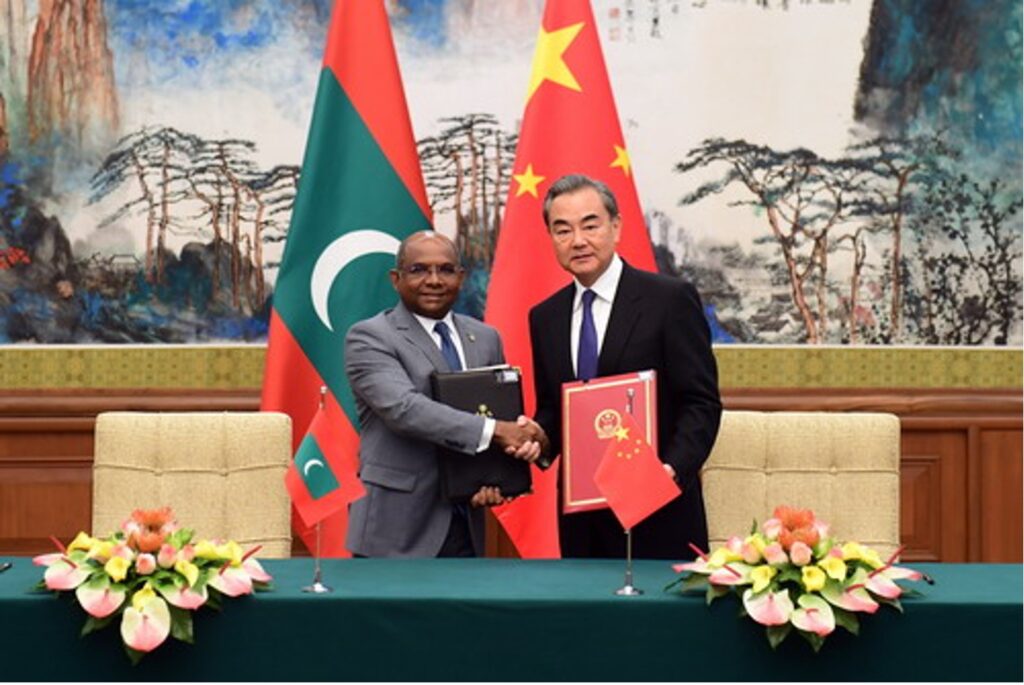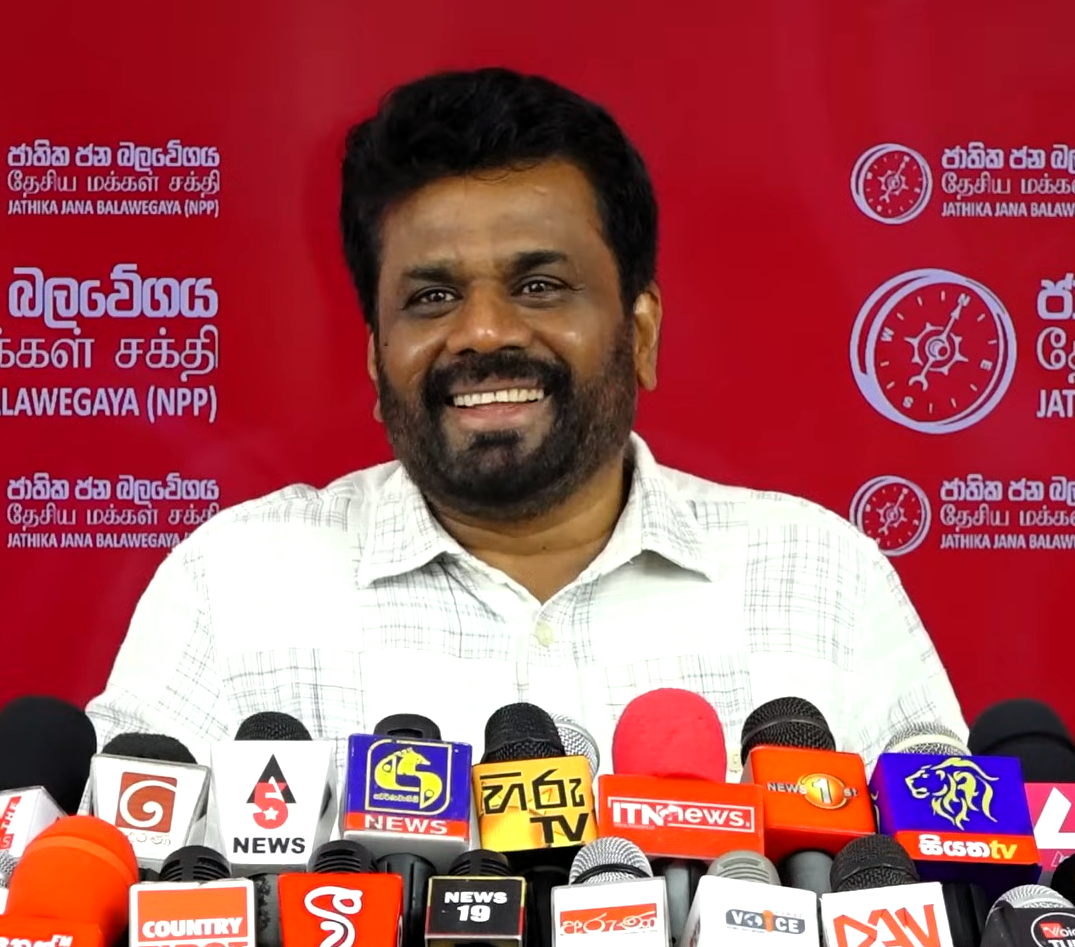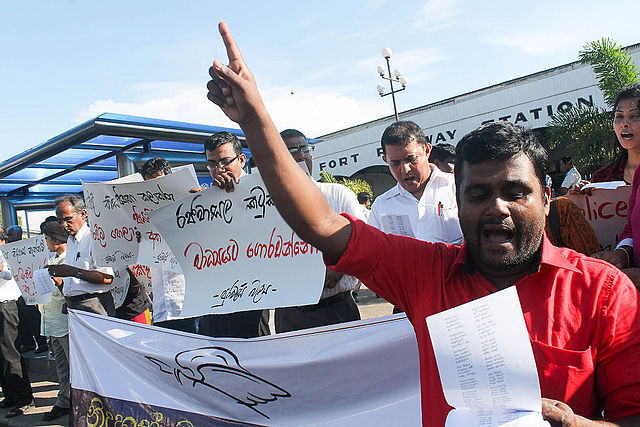By Mimrah Ghafoor – Associate Fellow at SAFN June 5th, 2023

Pic: Foreign Minister Abdulla Shahid of the Maldives with State Councilor and Foreign Minister of China, Wang Yi
The year 2022 marked both the bicentennial of formal diplomatic relations between the Maldives and China, and the penultimate year leading to the Maldives’ presidential elections, scheduled for September 2023. Thus, Chinese Foreign Minister Wang Yi’s visit to the Maldives in January 2022 coincided with a year laden with symbolism and geopolitical significance, given that different Maldivian administrations have evinced varying attitudes towards China.
For instance, former President Yameen Abdul Gayoom favored strong relations with Beijing, in contrast to incumbent President Ibrahim Mohamed Solih, who favors a more cautious approach and has strengthened ties with countries such as India and the United States, which view China as a rival. Hence the return of a Yameen-led administration would be more ideal for Beijing in terms of their ability to exert influence over the strategically-located island nation.
While Beijing has been accelerating its engagement with the present administration, it can be reasonably inferred that this is to lay the groundwork in anticipation of the return of a government more overtly in favor of engaging China. This is a distinct possibility, given the current administration’s increasingly uncertain path to electoral victory.
Near Seas Defence, Far Seas Protection
Wang Yi’s visit also came on the heels of China’s annual visit to Africa, with which Beijing traditionally kickstarts its diplomatic year. By immediately following up that visit with trips to Comorros, Sri Lanka and Maldives, Beijing was making a statement about the future of its strategic priorities.
While China’s primary interests lie in the East and South China Seas, the bulk of its energy imports travels the Indian Ocean’s sea lanes, through its critical access points such as the Malacca Straits. Additionally, the Indian Ocean is important for the Maritime Silk Route component of President Xi Jinping’s Belt and Road Initiative, a series of massive infrastructure and connectivity projects spanning Eurasia.
Thus, since joining an international taskforce to combat piracy off the Gulf of Aden in 2008, China has, as part of a two ocean strategy, steadily built up a regional naval presence in the Indian Ocean (supported by a logistics facility based in Djibouti since 2017). To further buttress this presence, China also endeavors to strengthen ties with centrally-located Indian Ocean island nations such as Sri Lanka and Maldives.
Inroads and Setbacks
China’s relations with Maldives accelerated quickly after opening their resident embassy in 2011, reaching new heights once Yameen was elected president in 2013. Deteriorating relations with neighboring India, and China’s willingness to ignore the democratic backsliding and corruption which marred his administration made Beijing an attractive partner to Yameen, who signed the Maldives up for the BRI in 2014.
Subsequently, Chinese companies began to finance major domestic infrastructure projects in Maldives, including a bridge connecting the capital island with the nearby islands of Hulhule and Hulhumale. He also attempted to ink a free trade agreement with China, which he forced through parliament absent a quorum or proper legislative vetting.
Critics alleged that the country’s debts accrued to China under Yameen jeopardized Maldives’ economic sovereignty. By the end of his administration, some estimates put the Maldives’ debts to China at over 1billion USD, a proportionally large amount for a country whose GDP is barely over 5 Billion USD.
When Yameen lost the 2018 presidential elections to Ibrahim Solih, it represented a setback for China, given Solih’s stated intention to review trade deals with China and given his hesitancy to ratify a free trade agreement.
It is true this setback should not be exaggerated: the Maldives’ infrastructural-needs cannot be met by fully disengaging from the world’s second largest economy, and Beijing remains involved in major projects in the county from housing to upgrading Velana International Airport. China also remains a major source of tourists to the Maldives, a country whose economic growth is primarily driven by the tourism industry. However, Solih prefers to rely on India as the country’s major economic partner, and his caution towards scaling up commercial engagement with China (leaving Maldives’ continued commitment to the BRI on shaky grounds) frustrates Beijing. In a 2022 interview, China’s Ambassador to the Maldives, Wang Lixin, lamented Solih’s continued reticence to ratify the bilateral free trade agreement pushed by Yameen.
Solih has also strengthened ties with countries suspicious of China’s motivations in the region. The current administration’s ‘India-First’ foreign policy gives primacy to relations with New Delhi, which remains worried that China is trying to enlist the Maldives into a metaphorical ‘string of pearls’ to encircle the subcontinent, and that the BRI is being weaponized through dual use infrastructure to support Chinese military projection. The pressure on Maldives’ to distance itself from China is further amplified by Washington, which has been increasing its engagement with Maldives as part of an Indo-Pacific strategy primarily aimed at containing Beijing.
Both Washington’s and New Delhi’s frequently allege that China practices ‘debt-trap diplomacy’, luring countries into taking on unsustainable debts to finance major projects prior to seizing their assets in a ‘debt for equity’ swap. While this narrative is vigorously denied by China, it has found purchase among influential Maldivian politicians, including former President and current Speaker of Parliament, Mohamed Nasheed, who despite being estranged with Ibrahim Solih, remains the head of Solih’s party, the Maldivian Democratic Party (MDP).
Hedging Bets
Considering the above, the return of a Yameen-led administration in September would be ideal for Beijing, given Yameen’s unequivocal preference for engaging with China and his fraught relations with India – his party, the Progressive Party of Maldives (PPM) currently advocates an (officially banned) “India Out campaign’ protesting India’s allegedly outsize influence over the country.
Solih faces an uphill path to re-election. The MDP is factionalized between supporters of Solih and Nasheed, who have not reconciled after the former won a bitterly contested primary. Further, Solih’s victory in 2018 drew momentum from the support of a coalition of parties. The state of that coalition is now fragile.
As of this year, former coalition partner Ibrahim Qasim, who as leader of the Maldives’ third largest party, the Jumhooree Party (JP) is often kingmaker in Maldives’ elections, has broken ranks with Solih to contest the elections himself; and Nasheed has indicated his faction of the MDP will endorse JP during the election (a fact which should concern Beijing given Nasheed’s stridently anti-China views). With a divided party and an unraveling coalition, Solih’s reelection prospects are somewhere between plausible and dim.
Yet all is not well for Yameen either: despite winning his party’s nomination, Yameen is currently sentenced to 11 years in prison for money laundering charges. Despite ongoing court appeals, whether he can legally contest the elections or if PPM will consider putting forward another candidate remains uncertain.
For the time being, China continues to steadily increase its engagement with the Solih Administration. During Wang Yi’s visit to Maldives the two countries agreed to cooperate on a range of items from mutual visa exemption to maintenance of the China-Maldives Friendship Bridge; Further bilateral agreements have followed this year. Through this approach, Beijing can hedge its bets by solidifying good relations with the current government, while laying the groundwork for a more robust partnership should a Yameen or PPM administration regain power.
Mimrah Ghafoor is a Maldivian national and an Associate Fellow at South Asia Foresight Network(SAFN), the Millennium Project. He holds a Master of Arts in International Relations from the University of St. Andrews. From September 2021-September 2022, Ghafoor worked as lead speechwriter to the President of the General Assembly at United Nations Headquarters in New York City, where the Maldives’ incumbent Foreign Minister Abdulla Shahid chaired over the 76th Session.



